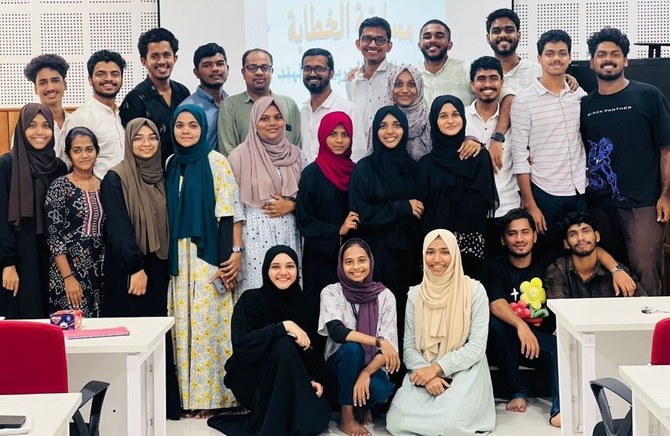NEW DELHI: Students across India will be taking part in a series of events organized by Saudi Arabia to engage learners and promote the Arabic language in the world’s most populous nation.
The King Salman Global Academy for Arabic Language partnered with universities in Delhi and Kerala to hold the Arabic Language Month, an initiative aimed at developing and improving its teaching for non-native speakers.
The program, which was launched on Monday and will end on July 26, will include Arabic language competitions for students and training for teachers, said Mujeebur Rahman, professor at the Center of Arabic and African Studies in Jawaharlal Nehru University in Delhi.
“There is a competition among students in Arabic language … Students from all over India, not just Delhi, will participate in it,” Rahman told Arab News on Tuesday.
The initial phases of the competition will be conducted online, with the final scheduled to take place at JNU on July 15.
Another major part of the program is the teachers’ training, which will be an exchange of knowledge between Arabic lecturers from India and trainers from the King Salman academy.
“They want to promote the Arabic language in India … It is a kind of cultural interaction between India and Saudi Arabia,” Rahman said.
Since it was established in 2020, KSGAAL has been committed to preserving and sharing Arab culture and heritage, while its work has focused on fostering a greater understanding of Arabic.
The Arabic Language Month is aimed at “inculcating some values, passion about the Arabic language” in India, said Dr. Noushad V., who heads the Department of Arabic at Kerala University.
“The enthusiasm to learn Arabic is increasing day by day … For the first time, they are starting this training for the teachers and students,” Noushad told Arab News.
As there are about two dozen universities offering courses in Arabic language across India, Noushad is expecting cooperation to conduct proficiency tests for Indians seeking education or work in the Middle East, which is already home to some 9 million people from the South Asian nation.
In states like Kerala, Tamil Nadu and Hyderabad, there are Arabic programs at the graduate and post-graduate levels that could benefit from direct training from the KSGAAL’s scholars, Noushad said.
It is also an opportunity for Keralites working in the tourism industry, as the state is becoming an increasingly popular destination among Middle Eastern tourists.
“These people have not got any training from the people who are speaking Arabic language … as a mother tongue,” Noushad added.
“Here comes the importance of this kind of programs, which are sponsored by the agencies in the Gulf countries and Saudi as a leading country providing training, workshops, resource materials for the students of Arabic language in India.”

























